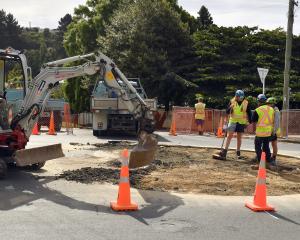The New Zealand Union of Students Associations (NZUSA) said yesterday about 15% of the New Zealand university student population were suffering "absolute financial distress".
NZUSA said that had been a key finding from a baseline report of the Graduate Longitudinal Study New Zealand, released this month.
That 15% figure would amount to more than 3000 students if extrapolated to University of Otago's population of more than 20,000 full and part-time students.
The study conducted baseline sampling of nearly 9000 final-year students across New Zealand's eight universities last year.
Students faced many financial problems, including the "huge costs" of setting up flats at the start of the year, such as paying bond money and buying furniture, and OUSA was helping students with financial problems through its Student Support Centre.
The centre had issued more than 80 food parcels so far this year.
Otago Polytechnic Students Association president Rebecca Hohaia said most Otago Polytechnic students were suffering some level of " financial stress" this year and some students were struggling to survive "day to day".
OPSA officials said a "huge" increase in demand for food vouchers had resulted in the value of the vouchers issued this year doubling, compared with the same time last year, to $1800.
Ms Hohaia said about two-thirds of students were ineligible for allowances because of the parental means test, and said the Government should restore a universal student allowance.
Student leaders said the city's tertiary students also faced problems resulting from rising food and power costs, trouble finding part-time work, higher costs for students with children, as well as looming heating costs linked to the Dunedin winter.
Otago University student services director David Richardson said the university had no figures for the number of Otago students experiencing "severe financial hardship", but this was a "significant issue" for some students.
"The university is very concerned that some students suffer financial distress because, amongst other things, it can adversely affect their academic outcomes.
"To help meet students' needs in this respect we have contracted OUSA to provide services that include budgetary and other advice, and a food bank," Mr Richardson said.
The national graduate study was commissioned by Universities New Zealand, backed financially by the Tertiary Education Commission and undertaken by the National Centre for Lifecourse Research (NCLR), which is headquartered at Otago University and led by centre co-director Prof Richie Poulton.
The study found that as many as one in six students reported they did not have enough money for their basic accommodation, clothing and food requirements.
This "striking" finding reinforced what NZUSA had been saying about "widespread student poverty", and showed an overwhelming need for a rise in allowance rates, and an expansion of allowances to those excluded by parental means tests, NZUSA vice-president Arena Williams said.












